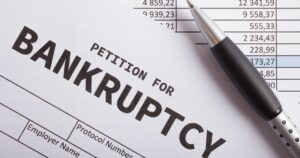Will you lose your home if you file for bankruptcy? A common concern for homeowners who are contemplating bankruptcy is whether they will lose their home.
Know the Difference Between Chapter 7 and Chapter 13
Two common types of bankruptcy are Chapter 7 and Chapter 13 bankruptcy. Both will stop a foreclosure, but they are used for different reasons and in different circumstances. Understanding each will help you make the right decision if you do have to file for bankruptcy protection. Here are some differences between the two to keep in mind:
- Chapter 7 bankruptcy sells off assets. Chapter 13 reorganizes them.
- Chapter 7 requires a low disposable income. Chapter 13 requires a maximum level of unsecured or secured debt.
- Chapter 7 is usually completed within three to four months. Chapter 13 requires a repayment plan, which usually takes three to five years.
- Chapter 7 can only reduce a loan principal on secured debts related to personal property. Chapter 13 reduces all loan balances if other requirements are satisfied.
- “Lien stripping” allows you to eliminate a junior lien, such as second or third mortgage, from your real estate. You can strip a junior mortgage, and the associated lien, if the house is worth less than the balance of the senior mortgage. Lien stripping is unique to Chapter 13 bankruptcy. You can’t do it if you file for Chapter 7.
With Chapter 7 bankruptcy, you can get a quick fresh start and get rid of any qualifying debts, but the trustee (your lender) can sell any property that is not exempt under the terms of the bankruptcy. Exempt property, the property that does not have to be sold, includes things like homes, reasonable household furnishings and appliances, welfare benefits, and personal injury settlements.
Chapter 7 doesn’t allow for catching up on missed payments or avoiding foreclosure in the long term. You can use Chapter 7 to hold off foreclosure when you file. With this type of bankruptcy, you are essentially selling off all your assets to pay your debts. You can exempt a certain amount of home equity, protecting a portion of your house, called a homestead exemption.
With Chapter 13 bankruptcy, on the other hand, you can keep all your property. However, you must work a plan to catch up on overdue payments, such as mortgage payments, car payments, or other debts. You must make payments every month for the term of your agreement, and you may have to pay back some of your unsecured debts. Unsecured debts are things like credit cards, which aren’t secured by collateral.
While the bank can’t take your home with Chapter 13, you don’t get to erase the debt. You must pay all your bankruptcy fees, priority debts like child support, tax debts, and employee wages, secured debts like your home and car, and other unsecured debt.
Which one you choose depends on what your end goal is. If you need to buy time before selling your house, Chapter 7 can be a good option to give you a fresh start. If you’re trying to stop foreclosure altogether and save your home, Chapter 13 is a better option. The process for handling either can be complex with many qualifications and having a bankruptcy attorney in your corner can help you avoid critical errors when making decisions and filing.
When to Choose Chapter 7 Bankruptcy
Chapter 7 bankruptcy wipes out any unsecured debt, such as credit card debt. It does not include debt that you owe to a governmental agency or student loan program. In addition, any child support obligations, alimony, or criminal fines will usually remain.
When should you choose Chapter 7 bankruptcy? Consider it in the following situations:
- You are having trouble staying up to date with payments and want to pay off any debt that you can—even if that means losing your property.
- You do not think a payment plan will work as you are hardly making ends meet now and lack the extra income to settle your debts (even at the bare minimum).
- Your income is lower than your state and county’s median income.
Chapter 7 Bankruptcy and Your Home
If you file for Chapter 7, you do not have to repay your debts. Instead, debts are discharged through the courts, but you are required to give up your property that is not exempt. In the state of Washington, a trustee collects all your assets that are not exempt and sells them. You can keep certain secured debts, such as your furniture, home, and car. But you must reaffirm, or agree to, those debts. That requires you to sign a “Reaffirmation Agreement.” If you do sign this agreement, you cannot file bankruptcy on those items for eight years, and you are required to meet the payment obligations just as you were prior to filing for bankruptcy.
In this situation, homeowners should first consider if they can afford their mortgage payment. Also, you must repay any back-owed payments before you can reaffirm the debt; that is, the debt must be current. So, if you are three months past-due on your mortgage, you must first make the three months’ worth of payments, and then sign the reaffirmation agreement with the lender.
When to Choose Chapter 13 Bankruptcy
Chapter 13 bankruptcy means a three to five-year repayment plan. While your unsecured debts will remain, you will work with the court to set up a plan to take care of the debts over a designated period. You will pay a bankruptcy trustee a set amount each month, and they will disperse that amount accordingly to creditors.
This chapter is for you if:
- You have high debts, including from mortgage and vehicles, and you would like to arrange a better plan for repayment.
- You are struggling to stay afloat with all debts, including spousal maintenance, child support, fines, student loans, taxes, and more.
- You would like to prevent your assets, such as your car and home, from foreclosure or repossession.
Chapter 13 Bankruptcy and Your Home
If you file under Chapter 13, you can keep all property. With Chapter 13, you make a payment plan with the court, and your assets are overseen by a court-appointed trustee. You must make the monthly payments in full and on time. Typically, these plans take three to five years, but once the payment plan is complete, you are out of bankruptcy.
Other Exemptions
Your homestead exemption protects your home from creditors other than your mortgage company. After you reaffirm your mortgage, your homestead protects your equity. If your home has equity, and that equity exceeds your exemptions, then the trustee can elect to liquidate the home and distribute the proceeds. Therefore, you will want to have your bankruptcy attorney assess your equity situation. You are, however, entitled to the value of your exemption in that asset, as a cash payment, after it is liquidated.
Understanding the Emergency Bankruptcy Petition
Emergency bankruptcy refers to getting bankruptcy protection without going through the full process of completing all the required forms. You might not have the time to put a full bankruptcy filing into play, but if you file just a few forms and take a credit counseling course, you can buy an extra 14 days for yourself to file the full bankruptcy paperwork with the courts.
The emergency petition can stop your foreclosure. If you’ve gotten a foreclosure notice from the bank, read it over very carefully so you can determine the process and date of your foreclosure sale. For the most part, the state must give you plenty of time and provide a statutory period before they can set a date for a foreclosure sale. The exact amount of time can vary from state to state, but your notice should identify it.
As soon as you file the emergency bankruptcy petition, your lender cannot move forward with the sale as an automatic stay takes effect. Bankruptcy can continue to delay or stop foreclosure. However, when the lender sells the property, you don’t own it anymore, and you can’t use bankruptcy to get it back.
Understanding Qualifications for Emergency Filing
For a Chapter 7 emergency filing, you will need to pass a means test that will determine whether you make too much money to file for bankruptcy or whether you have the means to pay your debts. If you pass the means test, you can file for bankruptcy.
The test will compare your income to the median income across the nation, based on your gross income rather than your net, and review your income sources over the relevant period. It will then account for your various expenses and determine if bankruptcy is a valid option for you.
Even if you plan to file Chapter 13, it could be a good idea to take the means test so you know exactly where you sit. The test can help you to make the right choice.
Be Aware of Exceptions to the Automatic Stay
While Chapter 7 or Chapter 13 bankruptcy triggers an automatic stay, two important exceptions exist that can cause you problems. Both relate to previous filings. If you have had a prior bankruptcy case dismissed over the last year, the automatic stay can last only for 30 days. If you have had more than one such case dismissed within the previous year, you get no automatic stay at all. These exceptions exist to stop people from repeatedly filing for bankruptcy to avoid paying debts.
In addition, the lender can file a motion to lift the stay unless you can show one of the following to be true:
- Foreclosure is illegal.
- The lender hasn’t fulfilled procedural requirements from the state.
- The lender hasn’t proven their authority.
- You have substantial equity that’s not possible to protect using an exception.
Know What You Need To Do
The process for filing an emergency bankruptcy has a lot of requirements and essential timeframes to hit. It is crucial to clearly understand the terminology, the process, and what you can expect. Give yourself time to complete the paperwork for a full bankruptcy by understanding how to file an emergency bankruptcy. Follow the guidance above to get started.
If you are experiencing financial troubles, do not feel like you are out of options. Individuals may qualify to file for bankruptcy.
Contact us today to schedule a consultation.


